Strictly Personal
Verbal primitivism as PR in an election year by Farooq Kperogi
Published
2 years agoon
It’s election season in Nigeria. The political public relations industry is abuzz. Political hopefuls are hiring hacks to write tendentious screeds that make them feel good but that no one reads. And, of course, smears, coarse insults, illogic, and prevarications are the core constituents of what passes for political public relations in Nigeria.
I have written about Nigeria’s peculiarly unpersuasive and unwarrantedly abusive political public relations in the past. I want to reflect on it again this week in light of the current political atmosphere and the heightened deployment of the same stale and sterile tactic of abuse as persuasion that I’ve written about in the past.
For the most part, Nigeria’s political public relations is crude, vulgar, and intellectually impoverished. No one who desires to change the hearts and minds of people should rely on it. It does no more than attract enemies, scare away potential converts, and ossify negative opinions about candidates or issues.
It consists in barbarous, impulsive, sophomoric insults against real and imagined political opponents—and cloying, hagiographic defense of principals or issues. It lacks nuance, is childish, and seems unconcerned with logic and persuasion. It’s also reactive and emotion-laden in the extreme.
The performance of Reuben Abati (who called critics of Goodluck Jonathan “collective children of anger”) and Doyin Okupe (who described himself as an “attack lion”), Femi Adesina (who murdered grammar by labeling government critics “wailing wailers”)—and several others before and after them—in the defense of their bosses and the demonization of their bosses’ real and imagined political enemies is a classic example of the kind of primitive political public relations that holds sway in Nigeria.
I think Femi Adesina and Garba Shehu have taken verbal primitivism in defense of their boss to an even higher plane. In their public relations, not only “political enemies” come under heavy fire; facts, truth, decency, and logic also become casualties.
They ignore the substance of critiques and try to muddy the waters by making the critic, rather than the critique, the issue.
Bishop Mathew Hassan Kukah is their latest object, as he had been in the past. As I pointed out in an April 19, 2022, article titled “Buhari Regime’s Bishop Kukah Obsession,” it appears that Adesina and Shehu are impelled by an uncontrollable urge to launch vicious personal attacks on Bishop Matthew Hassan Kukah each time he says anything remotely uncomplimentary about the Buhari regime.
“There seems to be a standing order, perhaps even an article of faith, in the Buhari presidency that Bishop Kukah must never be left unanswered,” I wrote. “Even a cough from him that remotely mimics the sound that Buhari’s name makes must be responded to with the pettiest, most sullen, and least sensible comeback.”
The desperation of the spokespeople of the Buhari regime is understandable, of course: The more a government comes to terms with its ineptitude, the more it feels the need to up its lies to mask its failures. That’s why propaganda and lies are always proportional to governmental incompetence. That is, the more incompetent a government is, the more it uses propaganda and coarse attacks on critics as a tool of governance.
Nonetheless, the object of public relations, especially political public relations, should be to arm supporters with the ideational resources to defend a person or a position, to win over people who sit on the fence, to persuade opponents to see a person or a point of view as reasonable and worthy of their respect, etc.
This has been the core preoccupation of political public relations since 64 BC when Quintus Tullius Cicero wrote Commentariolum Petitionis, regarded by many scholars as the “first publication on electioneering and political public relations.”
In the pamphlet, Cicero said the goal of what we call political public relations today is “securing the support of your friends and winning over the general public” in addition to “impressing the voters at large.”
He advised people seeking elective office to “take stock of the many advantages you possess,” “cultivate relationships,” ensure “your family and those closely connected with you” are “all behind you and want you to succeed,” “secure supporters from a wide variety of backgrounds,” “seek out men everywhere who will represent you as if they themselves were running for office,” be aware that there “are three things that will guarantee votes in an election: favors, hope, and personal attachment. You must work to give these incentives to the right people,” and, finally, that the “most important part of your campaign is to bring hope to people and a feeling of goodwill toward you.”
Persuasion takes time and work. Even at its best, it is often a gradual process consisting of small, incremental changes at a time. Crude insults don’t persuade; they only lead to a boomerang effect. Smart persuaders don’t mimic the tactics and strategies of critics. While critics tear down, persuaders build up. And they can disarm critics with grace, warmth, and facts (if they have fact, that is).
In the run-up to the 2015 presidential election, by far the most sophisticated political campaign season in Nigeria since 1999, both APC and PDP deployed the services of well-known American political public relations firms to sway voters in Nigeria because all Nigerian public relations experts know to do is bribe Op Ed editors of newspapers to plan coarse, vulgar abuses against perceived political opponents or hire online troll factories to smear and heckle critics.
APC has used the services of AKPD Message and Media, a political consulting firm owned by former Obama campaign manager David Axelrod. PDP also used the Potomac Square Group, another well-known consulting firm headed by Joseph Trippi, who managed Howard Dean’s failed presidential bid in 2004.
Axelrod’s AKPD Message and Media gave Buhari a rhetorical makeover. He went from being a perennial contestant who was dogged by the lumbering baggage of bigotry to someone more people than ever saw as an alternative to Goodluck Jonathan. There were no juvenile personal attacks against critics by overpaid minions hiding under the pseudonymic cover of the Internet.
They shunned Nigeria’s crude, vulgar, illogical, abusive, and transparently mendacious political public relations. They are smart enough to know that the problem with crude, abusive political public relations is that it only excites and fires up supporters (who don’t need it because their loyalty is already in the bag), but repulses opponents and puts off people on the fence.
The goal of every intelligent political PR should be, as I pointed out earlier, to convince people on the fence to join you and possibly also win over opponents.
Amnesic Romanticization of Jonathan
I read that scores of people have marched to the home of former president Goodluck Jonathan to plead with him to run for president again. The major argument advanced by people asking for his return to power was that a bag of rice was between N7,000 and N11,000 when he was president.
Well, if we decide that governance should be reduced to the price of a bag of rice, maybe some people should also go beg former President Olusegun Obasanjo to revive his stillborn Third Term project because a bag of rice during his tenure was around N2,500. That’s infinitely cheaper than the price during Jonathan’s time.
And I’d advise the dewy-eyed revisionists to reserve some of their energy so that 4 or 5 years from now when the price of a bag of rice jumps from its current price of N33,000 to possibly N50,000— or more— they can beg Buhari to return to power to restore the price back to N33,000.
If Jonathan couldn’t reverse the price of a bag of rice to the amount it was when he took over power in 2010, if the price, in fact, kept rising steadily throughout his regime, why do people think he can take back the price of a bag of rice from N33,000 to N11,000 if he becomes president again?
How can people be this simplistic and amnesic?
You may like
-


This Sudan war is too senseless; time we ended it, By Tee Ngugi
-


Air Peace, capitalism and national interest, By Dakuku Peterside
-


This is chaos, not governance, and we must stop it, By Tee Ngugi
-


Off we go again with public shows, humbug and clowning, By Jenerali Uliwengu
-


How patriarchy underpins gender violence today, By Tee Ngugi
-


Help! There’s a dangerous, secret plot to save the EAC from imminent death, By Charles Onyango-Obbo
Strictly Personal
This Sudan war is too senseless; time we ended it, By Tee Ngugi
Published
1 hour agoon
April 28, 2024
Why are the Sudanese Armed Forces (SAF) and the paramilitary Rapid Support Forces (RPF) engaged in a vicious struggle? It is not that they have ideological, religious or cultural differences.
Not that people should fight because of these kinds of differences, but we live in a world where social constructions often lead to war and genocide. It is not that either side is fighting to protect democracy. Both sides were instruments of the rapacious dictatorship of Omar el-Bashir, who was overthrown in 2019.
Both are linked to the massacres in Darfur during Bashir’s rule that led to his indictment by the International Criminal Court for crimes against humanity. They both stood by as ordinary, unarmed people took to the streets and forced the removal of the Bashir regime.
None of these entities now fighting to the last Sudanese citizen has any moral authority or constitutional legitimacy to claim power. They both should have been disbanded or fundamentally reformed after the ouster of Bashir.
The SAF and the RSF are fighting to take over power and resources and continue the repression and plunder of the regime they had supported for so long. And, as you can see from news broadcasts, they are both well-versed in violence and plunder.
Since the fighting began in 2023, both sides have been accused of massacres that have left more than 30,000 people dead. Their fighting has displaced close to 10 million people. Their scramble for power has created Sudan’s worst hunger crisis in decades. Millions of refugees have fled into Chad, Ethiopia and South Sudan.
The three countries are dubious places of refuge. Chad is a poor country because of misrule. It also experiences jihadist violence. Ethiopia is still simmering with tensions after a deadly inter-ethnic war.
And South Sudan has never recovered from a deadly ethnic competition for power and resources. African refugees fleeing to countries from which refugees recently fled or continue to flee sums up Africa’s unending crisis of governance.
Africa will continue to suffer these kinds of power struggles, state failure and breakdown of constitutional order until we take strengthening and depersonalising our institutions as a life and death issue. These institutions anchor constitutional order and democratic process.
Strong independent institutions would ensure the continuity of the constitutional order after the president leaves office. As it is, presidents systematically weaken institutions by putting sycophants and incompetent morons in charge. Thus when he leaves office by way of death, ouster or retirement, there is institutional collapse leading to chaos, power struggles and violence. The African Union pretends crises such as the one in Sudan are unfortunate abnormally. However, they are systemic and predictable. Corrupt dictatorships end in chaos and violence.
Tee Ngugi is a Nairobi-based political commentator.
Strictly Personal
Air Peace, capitalism and national interest, By Dakuku Peterside
Published
2 weeks agoon
April 16, 2024
Nigerian corporate influence and that of the West continue to collide. The rationale is straightforward: whereas corporate activity in Europe and America is part of their larger local and foreign policy engagement, privately owned enterprises in Nigeria or commercial interests are not part of Nigeria’s foreign policy ecosystem, neither is there a strong culture of government support for privately owned enterprises’ expansion locally and internationally.
The relationship between Nigerian businesses and foreign policy is important to the national interest. When backing domestic Nigerian companies to compete on a worldwide scale, the government should see it as a lever to drive foreign policy, and national strategic interest, promote trade, enhance national security considerations, and minimize distortion in the domestic market as the foreign airlines were doing, boost GDP, create employment opportunities, and optimize corporate returns for the firms.
Admitted nations do not always interfere directly in their companies’ business and commercial dealings, and there are always exceptions. I can cite two areas of exception: military sales by companies because of their strategic implications and are, therefore, part of foreign and diplomatic policy and processes. The second is where the products or routes of a company have implications for foreign policy. Air Peace falls into the second category in the Lagos – London route.
Two events demonstrate an emerging trend that, if not checked, will disincentivize Nigerian firms from competing in the global marketplace. There are other notable examples, but I am using these two examples because they are very recent and ongoing, and they are typological representations of the need for Nigerian government backing and support for local companies that are playing in a very competitive international market dominated by big foreign companies whose governments are using all forms of foreign policies and diplomacy to support and sustain.
The first is Air Peace. It is the only Nigerian-owned aviation company playing globally and checkmating the dominance of foreign airlines. The most recent advance is the commencement of flights on the Lagos – London route. In Nigeria, foreign airlines are well-established and accustomed to a lack of rivalry, yet a free-market economy depends on the existence of competition. Nigeria has significantly larger airline profits per passenger than other comparable African nations. Insufficient competition has resulted in high ticket costs and poor service quality. It is precisely this jinx that Air Peace is attempting to break.
On March 30, 2024, Air Peace reciprocated the lopsided Bilateral Air Service Agreement, BASA, between Nigeria and the United Kingdom when the local airline began direct flight operations from Lagos to Gatwick Airport in London. This elicited several reactions from foreign airlines backed by their various sovereigns because of their strategic interest. A critical response is the commencement of a price war. Before the Air Peace entry, the price of international flight tickets on the Lagos-London route had soared to as much as N3.5 million for the economy ticket. However, after Air Peace introduced a return economy class ticket priced at N1.2 million, foreign carriers like British Airways, Virgin Atlantic, and Qatar Airways reduced their fares significantly to remain competitive.
In a price war, there is little the government can do. In an open-market competitive situation such as this, our government must not act in a manner that suggests it is antagonistic to foreign players and competitors. There must be an appearance of a level playing field. However, government owes Air Peace protection against foreign competitors backed by their home governments. This is in the overall interest of the Nigerian consumer of goods and services. Competition history in the airspace works where the Consumer Protection Authority in the host country is active. This is almost absent in Nigeria and it is a reason why foreign airlines have been arbitrary in pricing their tickets. Nigerian consumers are often at the mercy of these foreign firms who lack any vista of patriotism and are more inclined to protect the national interest of their governments and countries.
It would not be too much to expect Nigerian companies playing globally to benefit from the protection of the Nigerian government to limit influence peddling by foreign-owned companies. The success of Air Peace should enable a more competitive and sustainable market, allowing domestic players to grow their network and propel Nigeria to the forefront of international aviation.
The second is Proforce, a Nigerian-owned military hardware manufacturing firm active in Rwanda, Chad, Mali, Ghana, Niger, Burkina Faso, and South Sudan. Despite the growing capacity of Proforce in military hardware manufacturing, Nigeria entered two lopsided arrangements with two UAE firms to supply military equipment worth billions of dollars , respectively. Both deals are backed by the UAE government but executed by UAE firms.
These deals on a more extensive web are not unconnected with UAE’s national strategic interest. In pursuit of its strategic national interest, India is pushing Indian firms to supply military equipment to Nigeria. The Nigerian defence equipment market has seen weaker indigenous competitors driven out due to the combination of local manufacturers’ lack of competitive capacity and government patronage of Asian, European, and US firms in the defence equipment manufacturing sector. This is a misnomer and needs to be corrected.
Not only should our government be the primary customer of this firm if its products meet international standards, but it should also support and protect it from the harsh competitive realities of a challenging but strategic market directly linked to our national military procurement ecosystem. The ability to produce military hardware locally is significant to our defence strategy.
This firm and similar companies playing in this strategic defence area must be considered strategic and have a considerable place in Nigeria’s foreign policy calculations. Protecting Nigeria’s interests is the primary reason for our engagement in global diplomacy. The government must deliberately balance national interest with capacity and competence in military hardware purchases. It will not be too much to ask these foreign firms to partner with local companies so we can embed the technology transfer advantages.
Our government must create an environment that enables our local companies to compete globally and ply their trades in various countries. It should be part of the government’s overall economic, strategic growth agenda to identify areas or sectors in which Nigerian companies have a competitive advantage, especially in the sub-region and across Africa and support the companies in these sectors to advance and grow to dominate in the African region with a view to competing globally. Government support in the form of incentives such as competitive grants ,tax credit for consumers ,low-interest capital, patronage, G2G business, operational support, and diplomatic lobbying, amongst others, will alter the competitive landscape. Governments and key government agencies in the west retain the services of lobbying firms in pursuit of its strategic interest.
Nigerian firms’ competitiveness on a global scale can only be enhanced by the support of the Nigerian government. Foreign policy interests should be a key driver of Nigerian trade agreements. How does the Nigerian government support private companies to grow and compete globally? Is it intentionally mapping out growth areas and creating opportunities for Nigerian firms to maximize their potential? Is the government at the domestic level removing bottlenecks and impediments to private company growth, allowing a level playing field for these companies to compete with international companies?
Why is the government patronising foreign firms against local firms if their products are of similar value? Why are Nigerian consumers left to the hands of international companies in some sectors without the government actively supporting the growth of local firms to compete in those sectors? These questions merit honest answers. Nigerian national interest must be the driving factor for our foreign policies, which must cover the private sector, just as is the case with most developed countries. The new global capitalism is not a product of accident or chance; the government has choreographed and shaped it by using foreign policies to support and protect local firms competing globally. Nigeria must learn to do the same to build a strong economy with more jobs.
EDITOR’S PICK


Behind the News: All the backstories to our major news this week
Over the past week, there were lots of important stories from around the African continent, and we served you some...
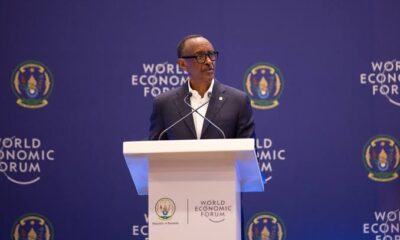

Video: How Rwanda is driving Ai revolution in Africa
In this video, the Managing Director of Rwanda’s Centre for the Fourth Industrial Revolution, Crystal Rugege, speaks on the country’s...


This Sudan war is too senseless; time we ended it, By Tee Ngugi
Why are the Sudanese Armed Forces (SAF) and the paramilitary Rapid Support Forces (RPF) engaged in a vicious struggle? It...
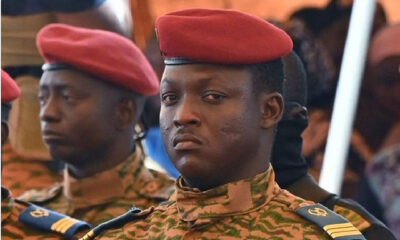

Burkina Faso investigating reports of northern killings
A government spokesman has revealed that Burkina Faso is looking into reports that 223 people were killed by the Burkinabe...
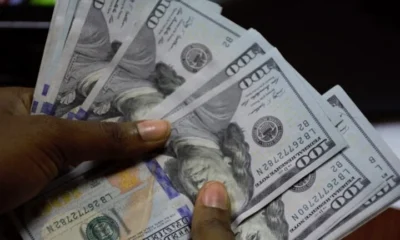

Nigeria: Bureaux De Change operators to harmonise retail FX market
Amidst the volatility around the Nigerian currency and its foreign exchange market, the Association of Bureaux De Change Operators in...


France willing to pay for Morocco’s 3GW power line to Western Sahara
Bruno Le Maire, the French finance minister, said on Friday that France was ready to help pay for a 3...
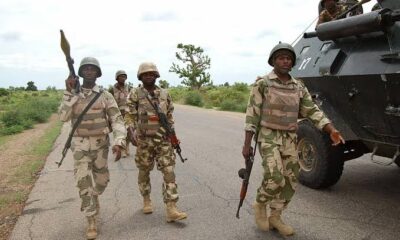

Nigerian troops neutralise 216 terrorists, arrest 332 in one week— Official
The Nigerian Army Defence Headquarters (DHQ) says troops from different operation theaters across the country neutralised 216 terrorists and arrested...
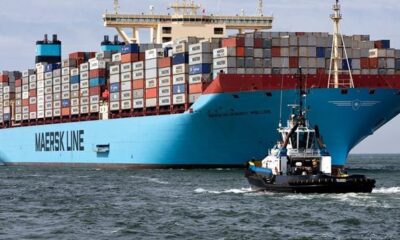

Nigeria loses $9.2 billion to foreign shipowners
A group of maritime experts has revealed that Nigeria loses $9.2bn a year to foreign shipping lines that carry goods...


Nigeria wants managers for proposed $10 billion diaspora fund
A tender paper shows that Nigeria is looking for fund managers for a $10 billion diaspora fund to bring in...


Al Ahly, Esperance to clash in CAF Champions League final
Two of Africa’s club giants, Egypt’s Al Ahly and Esperance of Tunisia, will do battle next month over two legs...
Trending
-

 Sports1 day ago
Sports1 day agoAl Ahly, Esperance to clash in CAF Champions League final
-

 Culture1 day ago
Culture1 day agoCollabo with Burna Boy enabled me buy house for my mum— Mozambican DJ Tarico
-

 Tech1 day ago
Tech1 day agoRepAir, Cella partner to launch carbon capture in Kenya
-
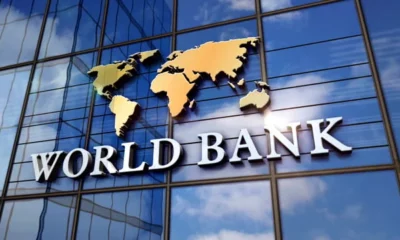
 VenturesNow1 day ago
VenturesNow1 day agoWorld Bank grants Malawi $57.6 million for food crisis


